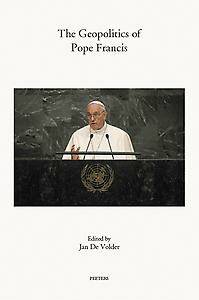
- Retrait gratuit dans votre magasin Club
- 7.000.000 titres dans notre catalogue
- Payer en toute sécurité
- Toujours un magasin près de chez vous
- Retrait gratuit dans votre magasin Club
- 7.000.0000 titres dans notre catalogue
- Payer en toute sécurité
- Toujours un magasin près de chez vous
Description
Jorge Mario Bergoglio was elected pope in March 2013 with a clear agenda of internal reform of the Vatican and the Catholic Church. Yet the reformist Pope Francis has also developed an outspoken political agenda. After more than six years of his pontificate, one can say that he has become an idiosyncratic and remarkable world leader. Among other things, he brokered an agreement between the US and Cuba; brought South Sudan's sworn enemies together in the Vatican, criticized 'the globalization of indifference' toward the plight of refugees and migrants; made the notion of 'periphery' central to his geopolitical approach; was the first Bishop of Rome to meet a Russian Patriarch of Moscow and to visit the Arabian Peninsula; signed an unprecedented agreement with the People's Republic of China; and issued several wake-up calls to Europe. This volume collects the contributions of international experts on different aspects of the geopolitical arena. Its aim is to provide insights into the pope's geopolitical approach and to help us understand the opportunities and challenges, as well as the strengths and weaknesses, of the Vatican's international policy in the era of Pope Francis. With contributions from Sandra Arenas, Jan De Volder, Massimo Faggioli, Brandon Gallaher, Agostino Giovagnoli, Marco Impagliazzo, Terrence Merrigan, Stefano Picciaredda, Giuliana Rotola, Johan Verstraeten and Jan Wouters. Jan De Volder (ed.) is a Belgian historian with particular interest in the roles of the Catholic Church and the world religions in international affairs. Currently, he holds the Cusanus Chair in 'Religion, Conflict and Peace' of the Faculty of Theology and Religious Studies at the KU Leuven (Belgium).
Spécifications
Parties prenantes
- Auteur(s) :
- Editeur:
Contenu
- Nombre de pages :
- 243
- Langue:
- Anglais
- Collection :
- Tome:
- n° 77
Caractéristiques
- EAN:
- 9789042940659
- Date de parution :
- 06-11-19
- Format:
- Livre broché
- Format numérique:
- Trade paperback (VS)
- Dimensions :
- 160 mm x 239 mm
- Poids :
- 408 g

Les avis
Nous publions uniquement les avis qui respectent les conditions requises. Consultez nos conditions pour les avis.






